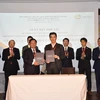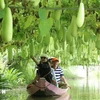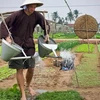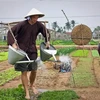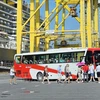Spain has helped Vietnam develop its tourism in a sustainable manner and in line with set orientations, according to participants at a ceremony in Hanoi on May 21.
This was clearly shown in a Spanish-funded project to enhance Vietnam ’s tourism competency in realising its tourism development strategy in the 2011-2020 period, with a vision to 2030, they said.
Funded by the Spanish Government through the Spanish Agency for International Cooperation and Development, the 400,000 EUR project was carried out in some Central Highlands and northern mountainous provinces from November 2011 to February 2013.
Addressing the ceremony hosted by the Vietnam National Administration of Tourism (VNAT) to wrap up the project, Director of the Institute for Tourism Development Research Ha Van Sieu spoke highly of the connectivity between the project and other related ones, especially those implemented in the northern mountainous area.
As part of the project, a community-based tourism website connecting northwestern provinces was established, serving as a forum for localities to exchange experience and popularise their images in tourism development, he said.
It also provided handbooks guiding the management and development of tourism for managerial staff, and the development of a green tourism label for shops, restaurants and hotels, Sieu said, adding that these documents are essential for Vietnam ’s sustainable tourism development.
Spanish Ambassador to Vietnam Alfonso Tena said Vietnam is on the right track to improve the quality and diversity of its tourism services to lure more foreign visitors, citing that the country expects to welcome 7 million international arrivals this year.
He added that the project, which focused on policies of social responsibility, aimed to help Vietnam meet international standards in providing tourism services to attract foreign tourists.
VNAT’s Director General Nguyen Van Tuan said that Vietnam will learn tourism development experience from Spain as it ranks second in tourism revenues and fourth in tourist attraction in the world.
Besides this project, Vietnam also received support from Spain through other projects, including those to popularise the Tourism Law, build Vietnam ’s tourism marketing strategy and make tourism planning for Cat Ba Island and Hue city.
Tourism cooperation between Vietnam and Spain has seen positive developments over the past time, with over 31,300 Spanish tourists visiting Vietnam in 2012 and 7,200 in the first four months of this year.-VNA
This was clearly shown in a Spanish-funded project to enhance Vietnam ’s tourism competency in realising its tourism development strategy in the 2011-2020 period, with a vision to 2030, they said.
Funded by the Spanish Government through the Spanish Agency for International Cooperation and Development, the 400,000 EUR project was carried out in some Central Highlands and northern mountainous provinces from November 2011 to February 2013.
Addressing the ceremony hosted by the Vietnam National Administration of Tourism (VNAT) to wrap up the project, Director of the Institute for Tourism Development Research Ha Van Sieu spoke highly of the connectivity between the project and other related ones, especially those implemented in the northern mountainous area.
As part of the project, a community-based tourism website connecting northwestern provinces was established, serving as a forum for localities to exchange experience and popularise their images in tourism development, he said.
It also provided handbooks guiding the management and development of tourism for managerial staff, and the development of a green tourism label for shops, restaurants and hotels, Sieu said, adding that these documents are essential for Vietnam ’s sustainable tourism development.
Spanish Ambassador to Vietnam Alfonso Tena said Vietnam is on the right track to improve the quality and diversity of its tourism services to lure more foreign visitors, citing that the country expects to welcome 7 million international arrivals this year.
He added that the project, which focused on policies of social responsibility, aimed to help Vietnam meet international standards in providing tourism services to attract foreign tourists.
VNAT’s Director General Nguyen Van Tuan said that Vietnam will learn tourism development experience from Spain as it ranks second in tourism revenues and fourth in tourist attraction in the world.
Besides this project, Vietnam also received support from Spain through other projects, including those to popularise the Tourism Law, build Vietnam ’s tourism marketing strategy and make tourism planning for Cat Ba Island and Hue city.
Tourism cooperation between Vietnam and Spain has seen positive developments over the past time, with over 31,300 Spanish tourists visiting Vietnam in 2012 and 7,200 in the first four months of this year.-VNA













